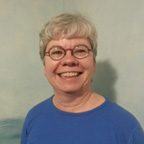- About Archives
- About SAA
- Careers
- Education
- Publications
- Advocacy
- Membership

Professional Experience: Head, Curation and Preservation Services, MIT Libraries, 2012–on. Digital Preservation Office: ICPSR, 2006–2012, and Cornell University Library, 2001–2006. Electronic Records Manager: Audata, 1998–2001, and Open Society Archives, 1996–1998; Electronic Records Archivist, NARA, 1986–1996; and prior positions.
Education: PhD, Archival Studies, University College London, 2009. MA, History, Northeastern University, 1983, certificate in archives administration. BA, History, Saint Anselm College, 1982.
Honors: Distinguished Fellow, Society of American Archivists, 2009. SAA Preservation Publication Award: Aligning National Approaches to Digital Preservation (ANADP), volume editor, 2013, and Digital Preservation Management, online tutorial, 2004. Digital Preservation Pioneer, NDIIPP, 2010. Research Fellow, Study of Modern Archives, Bentley Historical Library, 1994.
Professional Activities: Society of American Archivists: first Annual Meeting, 1984; DAS instructor, 2012–on; Program Committee: co-chair, 2011, and member, 1995; founder/co-chair, Research Forum, 2007–on; Electronic Records Section, 1994–1996, and Electronic Records Roundtable, 1992–1994; member/chair, Standards Committee, 2002–2005; member, Task Forces on the Archival Implications of the NII and on Electronic Records Strategies, 1994–1995; workshop instructor, 1991–on; member, Status of Women Committee, 1990–1992; member, Committee on Automated Records and Techniques (CART) Working Group, 1988–1994. International Council on Archives (ICA): Founder/chair, Digital Records Expert Group, 2014–on; Consultant, Committee on Electronic Records, 1996–2000. Mid-Atlantic Regional Archives Conference (MARAC): Technical Leaflets Editor, 1989–1990; Program Committee, 1990. New England Archivists (NEA): Printing Coordinator, 1984–1985. International Conference on Digital Preservation (iPres) Conference: co-chair, program committee, 2015; member, program committee, 2008–on; participant, 2005–on. Best Practices Exchange (BPE): Government Information in the Digital Era, Co-chair, Program Committee, 2010. Open Archival Information System (OAIS) International Development Activities: member, RLG/NARA Task Force on Digital Repository Certification (TRAC), 2003–2007.
Presentations: Regular presenter at national and international conferences; guest lecturer at several universities for graduate courses on digital archives, preservation, and curation. Digital Preservation Management Workshops: developer/instructor, dozens of multi-day workshops since 2003; developer/instructor, DigCCurr Institute, 2008–on; Digital Preservation Outreach and Education (DPOE): developer/ instructor, 2009–2013. Publications: Ongoing contributions to archival and digital preservation publications. SAA Research Forum Proceedings, 2007–on. Managing Digital Collections: A Collaborative Initiative on the South African Framework, 2010. Principles and Good Practice for Preserving Data, OECD, 2009. Technology Responsiveness for Digital Preservation: A Model, PhD thesis, March 2009. “The Five Organizational Stages of Digital Preservation,” with Anne R. Kenney, 2003. “Archives and Electronic Records,” special issue co-editor, ASIS Bulletin, 1993. “U.S. National Archives,” Archives of Data Processing History: A Guide to Major U.S. Collections, 1990.
***
Question posed by Nominating Committee: Describe your vision to raise the profile of archives and archivists and how you would leverage the strategic plan to move this forward.
SAA’s strategic plan stresses the need to “educate and influence decision makers about the importance of archives and archivists.” An effective means to raise the profile of archives and archivists is to demonstrate the ways in which the records we manage and the skills required of us contribute measurably to achieving the mission of organizations that create and use records, addressing the rights and interests of individuals, and advancing good practice for ensuring long-term access to the record of our community, locally and globally. Focusing SAA’s energy and other resources on providing targeted courses, collaborative opportunities, and outreach materials would be timely and beneficial.
Education: Expanding courses on topics such as digital essentials for everyone, tips for managing hybrid (physical and digital) collections, and advanced courses in partnership with other professions when appropriate that respond to trends and needs would leverage SAA’s educational track record and the success of the Digital Archives Specialist (DAS) program.
Opportunities: Highlight SAA’s ongoing participation in the development of standards and practice and expand opportunities, internal and external, to demonstrate the strengths and skills that archival practitioners and researchers bring to SAA and to the broader community. For example, the Research Forum explicitly addresses the strategic plan’s objective to “foster and disseminate research in and about the field,” a proven way to raise our profile. At the Forum, SAA members and participants from other professions and associations in North America and beyond share information, discuss essential issues, and identify additional opportunities to collaborate.
Outreach: Expand and (re)package SAA’s guidance documentation and other resources to enable SAA members to expand their reach to neighboring fields, creators, and users. Providing endless opportunities to hone and present our collective elevator pitch on archival value would raise our profile and strengthen our community.